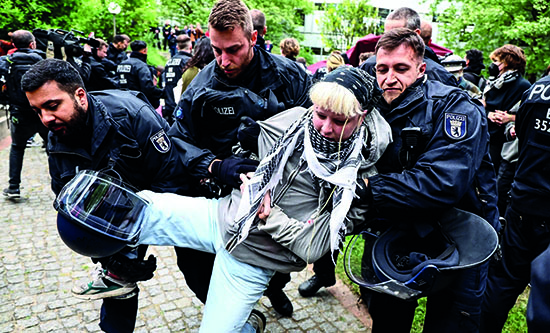Since the start of the war on Gaza, pro-Palestinian activists across Europe have taken to the streets in protest at their governments’ support for the Zionist onslaught on Palestine. In many countries they have almost immediately faced police repression to prevent an explosion of solidarity.
In Germany, where the legacy of the Holocaust is exploited by a racist government to crack down on Muslims, Palestinian solidarity activists face brutal repression. As one demonstrator put it, ‘we took to the streets for Palestine, but we are also taking to the streets against the oppression in Germany right now’:
- On 12 April, a three-day pro-Palestinian conference in Berlin was raided by 2,500 police. The event was to host speakers including British-Palestinian surgeon, Ghassan Abu Sittah and former Greek Finance Minister, Yanis Varoufakis. Both were denied entry into the country; the former was not even allowed to address meetings online. Police cut off power from the venue and dispersed the 200 attendees.
- Protesters were assaulted by police on 26 April at an encampment outside the Bundestag. The ‘Berlin camp’ began on 8 April, coinciding with the hearings of Nicaragua’s case against Germany in the International Court of Justice. The camp organiser, Jara Nassar, said ‘The idea was to draw attention to … the German complicity and active enabling of the Israeli genocide in Gaza.’
- In Leipzig, the university demanded that the police take action after over 50 students barricaded themselves in a lecture hall on 7 May. Though no arrests were made, criminal proceedings have begun against 13 protesters.
- 80 people were dispersed by the police at the Berlin Free University, with protesters being pepper sprayed and beaten. Arrestees were charged with trespassing and incitement to hatred.
In France:
- On 12 October, five days into the Israeli state’s genocidal campaign, protesters in Paris were attacked with tear gas and sprayed with fire hoses. A few days earlier France’s Interior Minister Gerald Darmanin had imposed a ban on pro-Palestinian protests, a step taken once before, in 2021.
- On 4 May, Ghassan Abu Sittah was banned from entering the country: it transpired that Germany had unilaterally imposed an entry ban which covered all of the European ‘Schengen area’ countries.
- At Sorbonne University, 86 people were arrested on the night of 7 May after around 100 students occupied a lecture theatre for two hours. Protesters were charged with wilful damage, intrusion in an education establishment and disrupting order.
In the Netherlands:
- Police arrested 50 people at the University of Utrecht after clearing out a camp at the university library on the night of Tuesday 7 May. Students had set up the encampment around 4.45pm that day with a banner reading ‘Cut ties with Israeli Colonisers and Free Palestine’ but were shut down after the university contacted the police. Dutch Prime Minister, Mark Rutte described the protest as a ‘form of anti-Semitism that we must continue to fight loudly and clearly’.
- On 8 May, 169 were arrested at Amsterdam University after an encampment was attacked by police using a bulldozer. Images of protesters being beaten with batons and their tents destroyed circulated after, according to one professor, ‘[the university executive board had] authorised extreme violence towards their own staff and students’.
- Ghassan Abu Sittah was also banned from entering the Netherlands to speak to Dutch MPs in Amsterdam.
In Italy, the recently-elected far-right Brothers of Italy government has endorsed brutal police actions against demonstrators:
- On 27 January, protesters demanding a ceasefire were beaten by police in Milan after defying a police ban on protests on Holocaust Remembrance Day.
- On 23 February, students in Pisa had planned to march to Piazza dei Cavalieri, where the Scuola Normale university is located. The 100 attendees, mostly high school students, were blocked by police.
- Students protesting against Italy’s role in the Israeli state’s genocide planned to march to, and disrupt, a conference at Valentino Castle in Turin on 24 April but were faced with a blockade and police truncheons.
- After a document signed by 2,500 students and 150 professors demanding ties be cut with the Israeli state was rejected by La Sapienza University, Rome, 300 protesters marched on 14 May to demand that it comply. They were met with police armed with batons, resulting in two arrests.
Across Austria, Palestinian solidarity has also been brutally attacked by the state:
- Protesters in Vienna, a few thousand strong, gathered in the capital on 12 October. Riot police were deployed to encircle and disperse the protests leading to 304 attendees being charged.
- One member of Not in Our Name, a pro-Palestinian Jewish organisation was arrested on 6 May at a protest outside the Federal Chancellery during an ‘Anti-Semitism Conference’.
- Three were arrested at Vienna University on 8 May, following a three-day long encampment. A police statement reported that tents had been confiscated and students dispelled during the night.
In Belgium, the government wants to remove the refugee status of Mohammed Khatib, European co-ordinator of Samidoun, a political support organisation for Palestinian prisoners. It is acting at the behest of the Israeli state. Samidoun is already banned in Germany. The drive to exclude pro-Palestinian activists from entering Europe hit the buffers when Ghassan Abu Sittah won a court case against his ban from Schengen area EU countries on 14 May. His lawyer Alexander Gorski said: ‘This decision is a significant turning point in challenging the hostile environment that Palestinian human rights advocates like Professor Ghassan have faced in recent months… [He] worked tirelessly to help Palestinians in Gaza, in dreadful conditions, and yet he has faced such unfair treatment on his return’ adding ‘this decision means that Ghassan’s freedom of expression and freedom of movement are no longer under threat, and he can speak out about what he witnessed in Gaza. This victory cannot be overstated.’
Isolate the Israeli State! Sanctions Now!
Aidan Keitley




